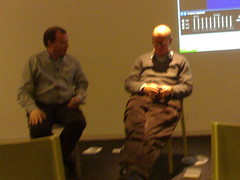Today we had Charles Leadbeater in to give a presentation. Leadbeater is an “award winning consultant” who used to be a journalist at the Financial Times. If you read Jeff Jarvis, Dan Gillmor, or Jay Rosen regularly you’ll know the story: mainstream media needs to change, it needs to engage better, it needs to realise that the audience is an important part of the conversation. And if it doesn’t do this it won’t be around for long because the old top down media model is being replaced by something new.
Leadbeater likes Nick Robinson (the BBC’s Political Editor), in part because he lives on the same street.
He didn’t, however, like Daniel something or other who, last night, reported for the BBC from outside the offices of Scotland Yard. The lights were on not, Leadbeater says, because people were busy working at their desks, but because West African cleaners had started the job of cleaning up after them.
In his view, not only did it not feel particularly authentic, the report as a whole failed to bring the audience anything. Instead of that report Leadbeater would have rather heard more about how Nick Robinson got the interviews he’d used, how many calls he made to get them, etc. That sort of information, in Leadbeater’s view, gives insight and authenticity.
Leadbeater, who doesn’t watch much television other than the 10 O’clock news worries that most TV news isn’t very engaging. It’s as if, he says, the TV news chain of production has spent the whole day creating reports then it all chugs off the assembly line during the 10.
So what does he think should replace this format? At the NewsXchange conference in Istanbul a few months ago he told one important news editor that he wants to see the bulletin start with a list of stories they considered but aren’t going to run – and point audiences to those stories on the website. He wants user interaction to stories, taken via the website, read out on-air in the programme and he wants people to be able to comment on the website and to question the presenters, reporters and editors after the programme.
He says that old ideas like working together and cooperation is a really powerful way to counter corporate power and hegemony, with the new tools that have or are coming along. He put the draft of his book about these topics on a wiki – it’s been there about 2 months and he’s just sort of thinking about the lessons he’s learned from this admittedly “tiny experiment”:
• He should have started the wiki when he started his book two years ago
• You can design tools for participation that look fantastic but people might ignore it – people like to have a choice of how to participate
• The conversation happens on other people’s sites, not just his – you have to find a way to link it together
• Doing it like this online fundamentally changes what you think of as a book – the point is to have a conversation, the book is just one means to do that, and not a very good way to do it.
So what if you applied this to news? Well, the main change would be that it would be more like a conversation rather than a delivery point.
During the question and answer session at the end, he talked about the recent Reuters photos from Lebanon that were exposed, by bloggers, as fake. Charlie pointed out that although he’s heard some journalists seize upon this as an example of audience members all being, potentially, people who want to trick them, instead it’s actually an example of something entirely different: had the editorial process been exposed to a few hundred audience members, never would have happened. What he meant was that the wisdom of the crowd caught, and could have prevented, the mistake.
Charlie doesn’t think mainstream media should try to own all the news communities we might create – and that such organisations, that is online communities, don’t react well to top down control. So what do fans of wikipedia, flashmobs,and ebay all have in common? At their heart, they’re about having trust in people.
News organisations need to learn to share it’s content too, and to make transparent the procedures and processes that the news goes through before it reaches news consumers.
Where does value for the audience come from? Not from number of reports or hours of airtime, but in the conversations that take place around them – the meaningful interactions that reporting the news kick-starts are valuable and should be tracked, pulled back in, used to inform and connect.
So does all content need to be participatory? Charlie thinks that, in one way or another it is now or will be, but to different degrees and extents…
Not a lot for me to disagree with here.
(Please note – I may edit this post for grammar, spelling and clarity later if I get a chance. I’ll note it here if I do I’ve added a few links to this post.)
UPDATE: Richard Sambrook has posted some audio of the presentation.
bookmark this post: del.icio.us l Digg l Furl l ma.gnolia l Newsvine l reddit l Yahoo MyWeb l Track with co.mments
